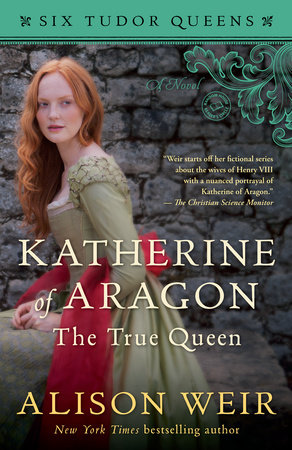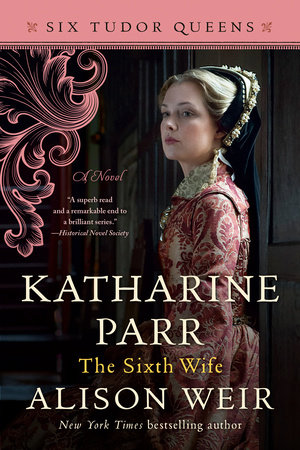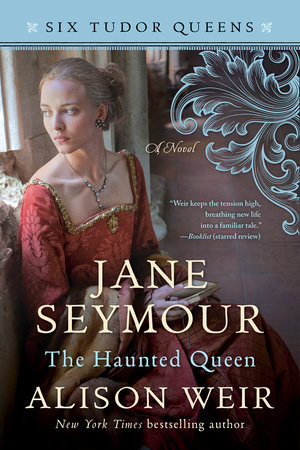Excerpt
Katherine of Aragon, The True Queen
Chapter 1
1501
The coast of England was closer now. Standing at the balustrade of the deck, high above the stern of the ship, with tendrils of red-gold hair whipping about her face, Catalina could see green and brown hills and the spires of churches, with houses huddled together beside them; and, at a dizzying distance below, between the land and the rolling vessel, the gray, churning sea. How different it all looked from La Coruña, with its warm blue waters and its mighty Tower of Hercules, or the dramatic wide sweep of the bay of Laredo! Everything was going to be different from now on.
Her maid of honor and dear friend, Maria de Salinas, was standing beside her.
“It cannot be long now till we come into port,” Catalina said. “When I think how many years I have dreamed of coming to England, I cannot quite believe I am nearly there. I thank God that you are with me, Maria. I would not want to face this alone.” There was no one else to whom she would have admitted that.
“And I am glad of your Highness being with me,” Maria replied. She was two years older than Catalina, and they had been friends all their lives. It was typical of Maria to have pulled off her cap and let her rippling long night-black hair blow free in the wind. She was almost dancing with anticipation, her large eyes luminous as she gazed at the land ahead. Catalina reminded herself that Maria was also going into the unknown. It was expected that she and the other young ladies in attendance on their Infanta would be found wellborn husbands in England. But where Catalina was facing the future with a certain trepidation, Maria could barely contain her excitement.
“Soon I will come face-to-face with Prince Arthur,” Catalina said. She had been told countless times that her betrothed was a golden prince, beautiful and graceful, with many excellent qualities, and that the English people hailed him as their great hope for the future. “I pray that I may please him.” And that all will be well.
“Judging by his letters, he is as eager to meet your Highness as you are to see him. You are lucky to have a husband who loves you.” Maria smiled encouragingly—and not a little enviously.
“But how can he love me when he has never met me?” Catalina asked, voicing a concern she had kept to herself for a long time. “Was he that much taken by my portrait?” Master Miguel, her mother’s court painter, had taken an excellent likeness.
“He could hardly have failed!” Maria said. “You are so pretty.”
“He is just fifteen!” Catalina retorted. “He is nearly a year younger than I am. I think he has been told what to write, just as I was. And—” She bit her lip. “—I fear he is young for his years. Remember how my coming was postponed for a year until he was ready to be married, and then it was postponed again?” That had been a strange business, veiled in secrecy. Not even to Maria would Catalina confide her secret suspicions that all might not be quite well with Arthur—and that some dreadful deed had finally made her coming to England possible. It was as if saying the suspicions out loud would confirm them. “At least it gave me time to learn French!” she said brightly. King Henry’s queen and his mother, the Lady Margaret, had specially requested it, as they spoke no Spanish or Latin. And they had urged her to cultivate a taste for wine, as the water in England was undrinkable. She had duly complied. She had expected many such requests and instructions to prepare her for her life in England, but there had been just one more, one that had immeasurably troubled her.
“King Henry wants me to forget Spain,” Catalina revealed. “He thinks I will be happier not remembering it. Dr. de Puebla wrote that to the King my father.” Dr. de Puebla was Spain’s resident ambassador in England, and it was he who had negotiated her marriage.
“King Henry means well, I am sure, Highness,” Maria soothed.
“I can never forget my homeland,” Catalina declared, tears welling as visions of the land of her birth came to mind, “but I am determined to be a good Englishwoman.” She blinked the tears away.
“We must make ready,” she said. And then, mimicking her duenna, “I must always remember that as soon as I set foot on English soil, I am no longer the Infanta Catalina but the Lady Katherine, Princess of Wales!” Catalina had been told that her name must be anglicized to please her husband’s future subjects, for one day, when King Henry died and Prince Arthur succeeded to the throne, she would be Queen of England.
Maria laughed—Catalina had Doña Elvira to the life! Catalina smiled, but as she went ahead of Maria down the steep stairs to the sterncastle, where she and the ladies of her suite had been allocated cabins, she was dutifully resolving to think of herself as Katherine from now on.
The cabins were cramped and creaking, with barely room for a feather bed, and they were unpleasantly stuffy after four days at sea. Mercifully, it had been a smooth crossing, unlike the earlier one from La Coruña. It was hard to believe that she had set out on her wedding journey more than five weeks ago, excited at the thought that the long-awaited new life was about to begin, yet grief-stricken at leaving her own country and the mother she loved and revered.
Four days in raging, storm-tossed seas had made homesickness pale into insignificance beside the fear of drowning and the constant irregular buffeting of the waves. Katherine and her ladies had been horribly, disgustingly sick. All those hours she had intended to devote to improving her English had been spent lying prone, clinging to her wooden cot as the ship bucked and dipped, and praying in terror for the tempest to stop. Her greatest fear had been that the storm was sent by God as punishment for the great sin that had made her marriage possible, and that they would all be drowned. But God, it had seemed, was reserving His vengeance for another day. Never would Katherine forget the relief she felt when the ship’s master managed by a miracle to dock at Laredo; and she had been full of devout thanks for the four weeks’ respite there while they were forced to wait for the seas to calm. She had hated boarding the ship again, dreaded entrusting herself once more to the unpredictable temper of the waters of the Bay of Biscay and the English Channel. Mercifully, they were calm, but she had still been horribly seasick.
Katherine and Maria found Doña Elvira in the largest cabin, which Katherine herself occupied. Her duenna came from an old and respected Castilian family and was devoted to Queen Isabella and determined to do her duty by Isabella’s daughter. In the absence of Katherine’s mother, Doña Elvira’s word was now law in the Infanta’s household. She was a stern, proud woman in her late fifties, with a disdainful eye and a sharp tongue, too vigilant for comfort—and too old to remember what it was to be young and bursting with life! And yet, for all her strictness and rigid outlook on life, the Queen trusted her implicitly, and had told Katherine that she must do so too.
Katherine watched as Doña Elvira heaved her bulk around the narrow spaces of the cabin and cast a critical eye over the four gowns laid across the bed as well upon the traveling chest, gowns of red and gold damask, woven silk, velvet of the costliest black, cloth of gold. Queen Isabella had commanded that her daughter go to England dressed as befit a future queen, and had paid for a sumptuous trousseau that reflected the glory and majesty of Spain. The chests that lay in the ship’s hold were packed with more sumptuous gowns, undergarments edged with fine blackwork lace, hoods of velvet with habiliments of gold, silver, or pearls. There were night robes bordered with lace for summer and fur for winter, cloth stockings and lined kirtles, as well as the stiff, decorous Spanish farthingales that belled out the skirts of Katherine’s gowns. Also packed in locked and weighty coffers were the gold and silver plate that was to form part of her dowry and her jewelry. She had exclaimed in amazement when her mother had shown her the intricate bejeweled necklaces, the ornate collars, the gold chains, the crucifixes, and the brooches that had been provided for her.
Then Queen Isabella had laid across her daughter’s outstretched hands a beautifully embroidered christening robe. “For your children,” she had said. “I pray that God blesses you with many fine sons. I hope you will be the source of all kinds of happiness in England.”
Katherine felt like weeping at the memory.
“This one,” the duenna said, pointing to the damask, “if your Highness approves.”
“Of course,” Katherine agreed. Her mother had instructed that she must trust Doña Elvira’s judgment in all things.
She stood patiently while three of her maids—Maria de Salinas and the twin sisters Isabel and Blanche de Vargas—stripped her to her farthingale and chemise, dressed her in a kirtle and the rich gown, laced up the back and tied on the wide hanging sleeves. Doña Elvira herself placed around Katherine’s neck the heavy gold collar adorned with gem-encrusted Ks and pomegranates, the Princess’s personal badge.
“The pomegranate stands for fertility,” Queen Isabella had said. “Your first duty to Prince Arthur will be to bear him sons.”
Katherine was ten when the collar was made, and ensuring the royal succession had been far in the future. But now she wished she knew more about the process of getting sons. Her mother and her duenna had told her that it was a wife’s duty to submit to the will of her husband in all things, and that children were born at his pleasure. Her mother, with many references to Scripture, had told her a little about how children were begotten, but there was still much mystery surrounding the whole business. Isabella’s obvious embarrassment and the euphemisms she used had left Katherine confused, and showed that decent people did not like to talk about such things. And yet, in a few weeks she would be married, and know the whole truth.
Doña Elvira lifted up a length of the finest white lawn, exquisitely hemmed. “Her Majesty’s command was that your Highness be veiled in public until you are married,” she reminded her charge as she combed Katherine’s long hair and arranged the veil over her golden head. And so it was that when the Princess emerged on the main deck to see sailors leaping across to the busy quayside to fling stout ropes around the bollards and secure the ship in dock, her view of Plymouth—the crowds gathered to welcome her, the banners gaily flapping in the breeze—was a misty one, glimpsed through the folds of her veil.
Once the gangplank was in place, her train began disembarking, led in stately fashion by the hero of Granada, the Count de Cabra, who commanded her escort. There followed Katherine’s first chamberlain, Don Pedro Manrique, who was Doña Elvira’s husband; the second chamberlain, Juan de Diero; Katherine’s chaplain, Alessandro Geraldini; three bishops, and a bevy of ladies, maids, gentlemen, and servants, all tricked out in their finest clothes and liveries. Never let it be said that the Spanish sovereigns, their Most Catholic Majesties King Ferdinand and Queen Isabella, had sent their daughter lacking in any way into England!
Katherine came last, escorted by Doña Elvira, whose bulk was resplendent in yards of green damask and black velvet, her gray hair covered by a voluminous hood. After waiting all her life—or so it seemed—for this moment, Katherine could hardly believe that it had arrived. She carried herself with conscious dignity and pride, aware that she was representing her parents and Spain, the greatest power in Christendom. Ahead of her swelled the sound of cheering voices, and when she stepped on land, even though she felt a little giddy after four days in motion on the sea, she knew a sense of triumph tempered with awe. This was the kingdom of which she would one day be Queen. God send that she would be worthy of it, and of the unknown prince, her husband.
The Mayor of Plymouth and his brethren, resplendent in their furred scarlet robes, were waiting to receive her, bowing low.
“Welcome, your Highness!” the mayor boomed. “Welcome to England!”
“I thank you, good sirs,” Katherine replied, inclining her head. She had practiced the words on board the ship. Her English was not very good, and it was heavily accented, but she was determined to master it.
The people were roaring their approval. Some were gaping and pointing at the dark-skinned Moorish servants in her Spanish retinue, but most were jostling each other to gain a better sight of their new princess. Katherine felt humbled to be the focus of such wild excitement, even though she knew that her father considered the King of England lucky to have a Spanish bride for his son.
“They could not have received your Highness with greater joy had you been the Savior of the world!” exclaimed one of Katherine’s gentlemen. Doña Elvira frowned. Men were not supposed to address the Princess familiarly. But even the stern duenna was gratified by her charge’s reception.
“His Grace the King sends his greetings, my lady,” the mayor said. “He looks forward to welcoming you himself in London, with Prince Arthur. But for now, at your pleasure, a great feast awaits your Highness.”









